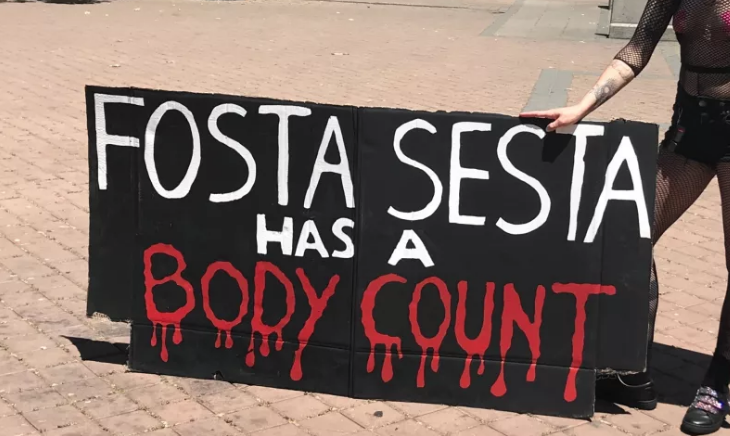Though it was signed into law in April 2018, it’s only recently that adult nightclubs and entertainers have begun to see the impact of FOSTA/SESTA. But what exactly IS that impact and what does it mean for the industry at large? We interviewed First Amendment attorney Larry Walters, whose firm is currently fighting against FOSTA/SESTA in the Federal Circuit Court, to find out more about this censorious new law.
“It’s the biggest piece of censorship legislation in 20 years.” So says First Amendment attorney Larry Walters, and he should know. Walters is referring to FOSTA, the Fight Online Sex Trafficking Act, legislation that was drafted by the House Judiciary Committee; and SESTA, the Stop Enabling Sex Traffickers Act, which was drafted by the Senate Commerce Committee. These two pieces of legislation were combined into one and signed into law by President Trump in April 2018. Walters and his firm, the Walters Law Group, are currently representing the Woodhull Freedom Foundation, and others, in a case (Woodhull Freedom Foundation et al v. United States) against FOSTA/SESTA. Walters and Woodhull have appealed the decision of the U.S. District Court in Washington D.C., and the case currently resides with the Federal Circuit Court of Appeals (also in D.C.).

Though FOSTA/SESTA does not exactly impact gentlemen’s clubs directly, it certainly impacts the way clubs and entertainers can promote themselves online, especially on social media. FOSTA/SESTA aims to prohibit “consensual sexual activity” under the guise of preventing sex trafficking, and makes it a federal crime to promote and/or solicit consensual sexual activity online. Perhaps more importantly, FOSTA/SESTA has also removed the “safe harbor” protection of Section 230 of the Communications Decency Act, which means that web “publishers” (including social media sites) are now liable for all speech on their platform. And because strip club entertainment is considered by some social media platforms to be “consensual sexual activity,” platforms like Facebook and Instagram are starting to suspend the accounts of anyone they find to be promoting “consensual sexual activity” on their platform.
“This is a war on porn, disguised as a war on sex trafficking,” says Walters. “Websites like Facebook, Instagram, Tumblr, etc., are now responsible for everything published on their platform. The fact is, if you have liability as a web publisher, you will over-censor. And all of the social media platforms could very well follow the lead of Tumblr, Facebook and Instagram.”

As Walters suggests, websites like Facebook and Tumblr are private companies who are under no obligation to protect the First Amendment or “freedom of speech” of those who use their platform. These site publishers face “serious federal penalties for failing to monitor the content on their platforms,” as Walters points out, which is exactly why Facebook changed their “community standards” recently. Users now risk having their Facebook account suspended if they post “Content that attempt to coordinate or recruit for sexual activities including but not limited to: Filmed sexual activities; Pornographic activities, strip club shows, live sex performances, erotic dances; Sexual, erotic or tantric massages.”
The bottom line is, FOSTA/SESTA may not specifically name strip clubs as “consensual sexual activity,” but social media platforms like Tumblr, Facebook (and Instagram, which Facebook owns) do. It makes more sense for them to err on the side of caution than to allow a strip club, an entertainer—or even this magazine/web publisher—to post something that the government could say promotes “consensual sexual activity.”
“This is a war on porn, disguised as a war on sex trafficking. Websites like Facebook, Instagram, Tumblr, etc., are now responsible for everything published on their platform. The fact is, if you have liability as a web publisher, you will over-censor. And all of the social media platforms could very well follow the lead of Tumblr, Facebook and Instagram.” – Larry Walters
What exactly are FOSTA and SESTA?
FOSTA and SESTA are two separate pieces of legislation that were combined into one “Frankenstein” law. FOSTA (Fight Online Sex Trafficking Act) came first, and was created by the bipartisan House Judiciary Committee. As Thehill.com website explains, “…the Judiciary Committee worked with law enforcement, victims’ groups, and the tech community to create FOSTA, a carefully crafted solution to end sex trafficking and prosecute those who perpetrate these horrific crimes. On the other side, the bipartisan Senate Commerce Committee passed SESTA, an ambiguous and overly-broad bill that creates liability for websites that may unknowingly host illegal user-generated content.” The House voted 338-25 to pass FOSTA, while the Senate voted 97-2 to pass the much more overbroad, censorious SESTA.

Who were the two Senators who stood up against SESTA? Noted Republican maverick Rand Paul (who gave no public explanation for voting against SESTA) and Democrat Ron Wyden of Oregon, who had this to say about his dissent: “Having written several laws to combat the scourge of sex trafficking, I take a back seat to no one on the urgency of fighting this horrendous crime. However, I continue to be deeply troubled that this bill’s approach will make it harder to catch dangerous criminals, that it will favor big tech companies at the expense of startups and that it will stifle innovation.”
The one word people should pay specific attention to in regard to the creation and passage of this legislation is “bipartisan”: Meaning, this is not a Democrat v. Republican thing and it’s not a Trump thing (even though Trump did sign technically sign this legislation into law). What it is, however, is a devastating blow to free speech online.
“We will never see a new Snapchat or a new Twitter, as long as FOSTA/SESTA exists as written,” says Walters. “This law will completely stifle online innovation because it ties the hands of publishers who are now forced to constantly monitor all of their content. “This is incredibly important and impactful, and we must watch carefully to see what the other web platforms are going to do.”
For more information on Larry Walters firm, visit FirstAmendment.com.





























